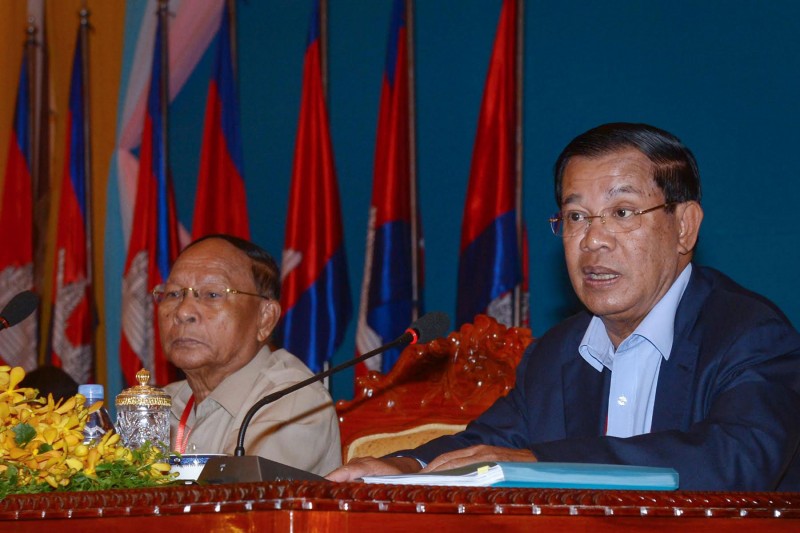Defender of the disabled, champion of the common man, upholder of social justice: meet the new face of the ruling party, carrying on many of its old themes.
On the heels of ongoing controversy over the opposition’s slogan, the ruling party spelled out 35 new slogans of its own on Thursday in a list that seemed to draw heavily from the populist rhetoric of its rival, rebranding itself as a social justice changemaker.

The slogans also play to traditional CPP themes. Voters are reminded that its January 7th overthrow of the Khmer Rouge regime is the cause for “everything we have today” with shouts of “long live peace, unity, development and democracy.”
Released by the CPP Central Committee to commune candidates, the list makes a slew of new promises: “roads, electricity, clean water in all communes”; “easy, fast, and trustworthy”; “land for people who don’t have residence and farms”; and “jobs for the people.”
The CPP “promotes freedom, stability, and social justice” and “helps disabled people, orphans, elderly people and the desperate to achieve a better life.”
While the CNRP is calling for voters to “change commune chiefs who serve the party and replace them with commune chiefs who serve the people,” drawing lawsuit threats from the ruling party, the CPP issued a change statement of its own: “Upgrade rural dirt roads to asphalt roads.”
The latest batch of slogans seem to echo past CPP campaigns, which emphasized peace, stability and infrastructure development, as well as from the CNRP’s more populist seven-point policy campaign platform from 2013.
The success of the latter in rallying votes appears not to have gone unnoticed by the ruling party, which subsequently pushed through several of the platform proposals, including salary increases for civil servants and garment workers as well as comprehensive health insurance.
CNRP President Kem Sokha claimed last month that the reforms were only enacted because of pressure from the opposition.
The commune election slogans also draw from the ruling party’s usual rhetorical war chest: a vote for the CPP is a vote for continued calm, while a vote for the opposition invites the return of war and chaos that the ruling party snuffed out two decades ago.
Given the youth of the Cambodian electorate, “generationally, it’s a tough sell,” wrote Sophal Ear, author of “Aid Dependence in Cambodia: How Foreign Assistance Undermines Democracy,” in an email on Thursday, noting that the threats of chaos were less vivid for voters who have only ever known peace.
“All they see is what they grew up seeing, and they’re not satisfied,” he said.
The CPP’s newer populist rebranding was also likely to fall flat, he predicted.
“Clearly they must think there are a lot of Rip Van Winkles living in Cambodia, asleep the past 20 years,” he wrote.
With the CPP attempting to cast itself as both the agent of social change and the protector against it, the party faces a credibility gap with the electorate, according to John Ciorciari, a Cambodia scholar at the University of Michigan’s Gerald R. Ford School of Public Policy.
“There certainly has been development, but most of the spoils have been concentrated heavily at the top between senior officials and their personal networks,” Mr. Ciorciari wrote.
“For most spectators, any warm feelings that arise from public spectacles will cool as they ride home, stuck in traffic and peering through the gates of the gleaming villas of the governing elite.”




